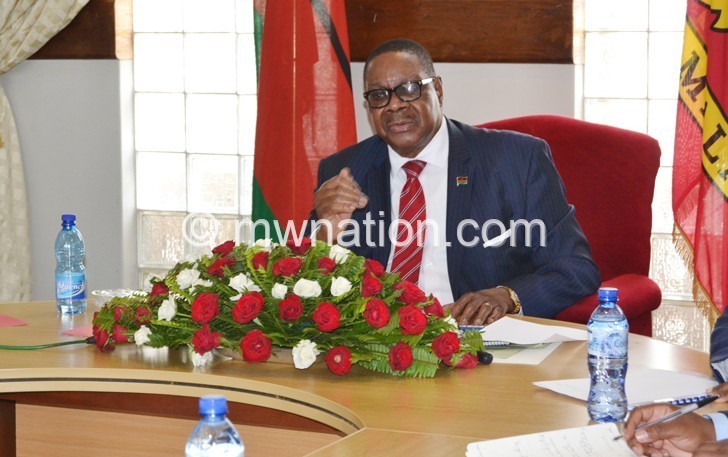Mutharika lifts maize export ban
President Peter Mutharika has ordered the immediate lifting of the maize export ban that government effected early this year to avoid creating a shortage of the staple grain.
Briefing the press after attending a joint meeting of the Agricultural Development and Marketing Corporation (Admarc) and National Food Reserve Agency (NFRA) senior managers at Admarc head officesin Blantyre yesterday, Mutharika clarified that the lifting of the ban was a measure to avoid a repetition of the mistake the country made in 2002 when maize was sold to Kenya, leaving thousands of Malawians affected by famine.

The President, who said the Chief Secretary to the Government will be working with the Ministry of Justice and Constitutional Affairs on a new Executive order in lifting the earlier order, said he is convinced that there is no threat in as far as the selling of maize abroad is concerned.
The lifting of the ban comes barely two weeks after farmers in the country protested its existence, wondering why government pushes farmers to practise good farming methods yet once surplus food is produced, the government closes borders, restricting them to selling their produce locally.
But Mutharika said he wanted to first ensure that there is enough maize in the country in the event of another poor harvest and that the export of maize would commence after the country reached a threshold of 234 000 metric tonnes (MT).
He said: “I am convinced that there is no danger now. My concern was always that I was not going to allow the export of maize until I was sure that there will be enough maize in this country, in the event of another poor harvest. I am now convinced that [the threshold] has now technically been reached.”
Mutharika, who said Admarc has exhausted its resources on the maize purchases, said the Minister of Agriculture, Irrigation and Water Development Joseph Mwanamvekha, Minister of Finance, Economic Planning and Development Goodall Gondwe and his chief economic adviser Collins Magalasi will today meet in Lilongwe to complete arrangements on providing more resources for the purchase of maize to resume at the soonest time possible.
Reacting to the lifting of the ban, chairperson for the Parliamentary Committee on Agriculture Joseph Chidanti Malunga applauded the President for taking an initiative to visit Admarc headquarters and lift the ban.
However, Malunga faulted Admarc for all along claiming that they have money to buy maize when they did not have any.
He said: “Each time we met them, they said they had the money and were buying. We went around the places they said they were buying from and we found that either they were not buying or they were buying in less quantities. So we asked them to explicitly tell us if they have money or not and we were told in Parliament when they appeared before the committee that they have money. So, basically they were cheating the President.”
Speaking to The Nation in a telephone interview, Farmers Union of Malawi (FUM) president Alfred Kapichira Banda, hailed Mutharika for lifting the ban but said it will not be of much benefit to the farmers themselves.
He said: “The lifting will not benefit farmers as such but middlemen and some merchants who kept more maize in their warehouses. These are the people who are going to benefit from this. But all in all we thank the President, though very late.”
His sentiments were also echoed by Speaker of Parliament Richard Msowoya, who said lifting the ban now will only benefit intermediate buyers as most farmers had already sold their commodity at low prices.
He said: “At the time of plenty, when you open up exports, the farmer can negotiate a higher price if they know the middle buyer will benefit. But what has happened now is that the farmer sold the commodity at a very cheap price. The supply was too much that it slumped the prices and the farmers sold all the maize. Now it is input season and the farmer does not have money which is bad for the country.”
Recently, the Malawi Confederation of Chambers of Commerce and Industry (MCCCI) also questioned government’s export limitations, saying it reduces the market for farmers who have the potential to export and defeats the whole purpose of regional integration.
In March, Mutharika ordered the deployment of Malawi Defence Force (MDF) soldiers along border posts to guard routes suspected to be used by smugglers of maize and tobacco to curb maize smuggling.





